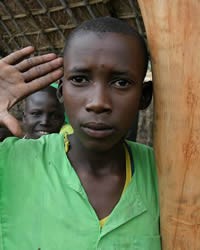Runga in Chad

Photo Source:
hdptcar - Flickr
Creative Commons
|
Send Joshua Project a map of this people group.
|
| People Name: | Runga |
| Country: | Chad |
| 10/40 Window: | Yes |
| Population: | 84,000 |
| World Population: | 118,000 |
| Primary Language: | Runga |
| Primary Religion: | Islam |
| Christian Adherents: | 0.00 % |
| Evangelicals: | 0.00 % |
| Scripture: | Translation Needed |
| Ministry Resources: | No |
| Jesus Film: | No |
| Audio Recordings: | No |
| People Cluster: | Ouaddai-Fur |
| Affinity Bloc: | Sub-Saharan Peoples |
| Progress Level: |
|
Introduction / History
The Runga comprise one of the Sudanic people groups living in Chad today. Most of the Runga are located in the southern part of the country, but another significant community live across the border in the neighboring Central African Republic.
An early agricultural civilization grew up around the headwaters of the Niger River and gradually spread eastward across the entire breadth of the Sudan to the Nile Valley. However, as it spread northward to the edge of the Sahara Desert, it did not penetrate the area where the inhabitants continued to live a nomadic life of hunting and gathering. Only as different varieties of crops were introduced by their northern neighbors did the tribes, such as the Runga, begin to adopt agriculture.
The region where the Runga live was once the final stop for four major Saharan caravan routes. As a result, the region was ruled by a number of strong native states with complex cultures and elaborate political systems.
What Are Their Lives Like?
Today, the Runga are primarily farmers, using hoe cultivation and irrigation techniques. Millet and wheat are the main crops grown, but onions, garlic, and melons are also cultivated. Livestock production is another important activity for the Runga. Horses, cattle, goats, sheep and chickens are raised for milk, butter, wool, eggs, meat, sacrifice and trade. Both men and women participate in the field work, but men alone do the clearing of the land and other heavy work. Men also tend to the animals, trade at local markets, and make family decisions. The women milk the animals, brew a millet beer, and prepare a daily millet-based porridge. They are also responsible for domestic duties, such as caring for the children.
Although some Runga live in large towns in clustered huts, many live in compact rural villages. The huts in the villages are grouped in compounds surrounded by grass mat fences. The houses are usually round, with cone-shaped, thatched roofs.
Runga marriages occur when the men are in their twenties and the women are in their late teens. Polygamy (having more than one wife) prevails but is restricted to the Muslim limit of four wives. When a couple marries, they live with the bride's family for two years then move into their own newly built house. Subsequent wives live in their own huts, but the first wife is "chief" over them.
What Are Their Needs?
The Runga have no Christian resources in their own language available to them. There is a great need for Christian broadcasts to be made available to them. Prayer, however, is the first step to seeing spiritual resistance broken down.
Prayer Points
Pray for dreams and visions of the Lord to come to Runga family leaders.
Pray for a record-breaking grain harvest for the Runga people that will be a testimony of God's power and grace.
Pray for the Lord to give Runga elders a spiritual hunger that will lead them to the empty grave.
Pray for a family-based movement to Christ among the Runga people.